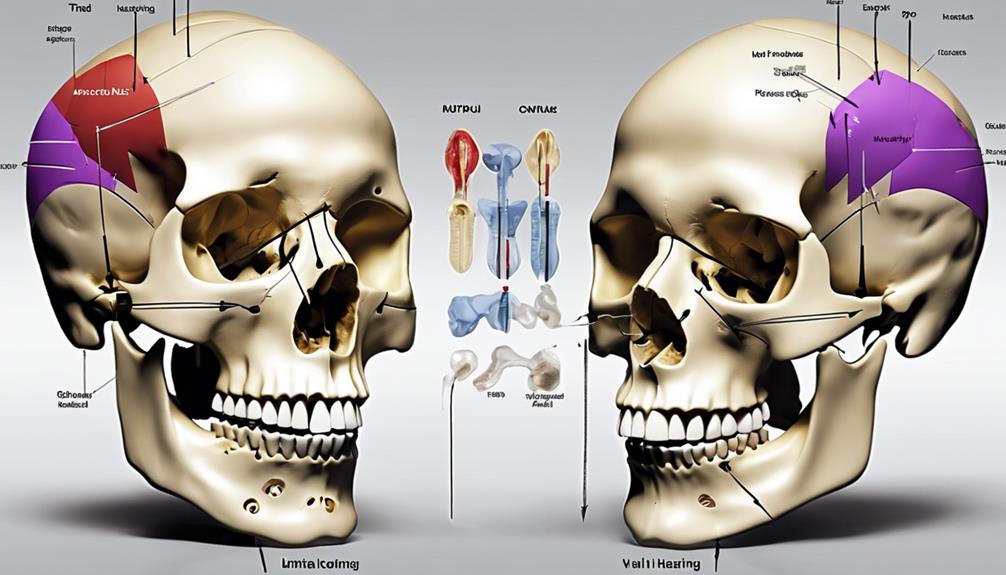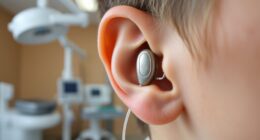When considering dental problems, hearing loss may not be the first thing that comes to mind. However, the unexpected link between an abscessed tooth and hearing loss can be quite enlightening.
The intricate relationship between oral health and our ears can have significant implications, and understanding how an abscessed tooth can lead to problems with hearing is essential.
Let's explore this intriguing link further to uncover the potential impacts on our overall well-being.
Key Takeaways
- Untreated dental abscesses can lead to inner ear inflammation, affecting hearing.
- Bacteria from abscesses can travel to the inner ear, causing hearing complications.
- Prompt dental care is crucial to prevent inner ear damage and hearing loss.
- Proximity of teeth to inner ear structures enables bacteria to impact hearing.
Dental Abscess and Hearing Loss
If left untreated, a dental abscess can lead to inflammation and infection spreading to the inner ear, potentially causing hearing loss. The close proximity of the inner ear to the teeth creates a pathway for bacteria from a tooth abscess to impact hearing. In cases where a dental abscess progresses, the inflammation can affect the nerve endings and blood vessels connected to the inner ear, jeopardizing its delicate structures and leading to hearing complications. The immune system may struggle to contain the infection, further exacerbating the risk of inner ear damage and subsequent hearing loss.
Maintaining good oral health is essential in preventing the development of dental abscesses that could ultimately affect hearing. Regular dental check-ups can help detect issues early on, allowing for timely interventions such as root canals to address abscesses before they escalate. Additionally, proper oral hygiene practices can reduce the risk of periodontal disease, which is often a precursor to dental abscesses. By prioritizing oral health, individuals can safeguard not only their teeth and gums but also their auditory health from the potential consequences of untreated dental abscesses.
Bacterial Infections and Auditory Impacts
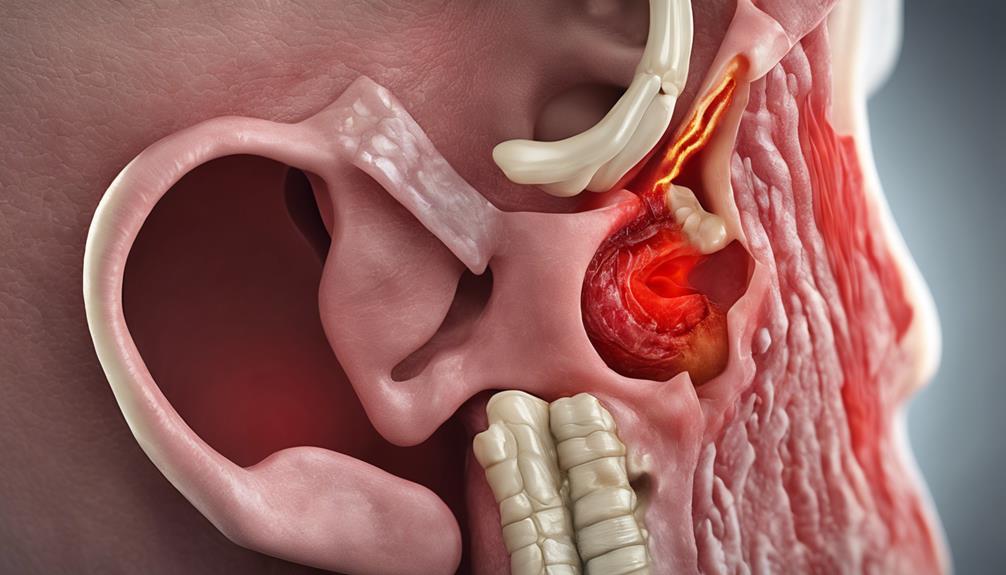
The impact of bacterial infections originating from an abscessed tooth on auditory functions highlights the critical connection between dental health and hearing well-being.
When bacteria from an abscessed tooth spread, they can travel through nerve pathways to the inner ear, leading to complications in auditory functions. The inflammation caused by the abscess can also reduce blood flow to the ear, affecting one's ability to hear.
The proximity of the teeth to the inner ear structures allows for bacteria to easily travel and cause issues like hearing loss. In cases of hearing loss due to an abscessed tooth, nerve damage or inflammation can disrupt the auditory system, emphasizing the importance of addressing dental concerns promptly.
Understanding the link between dental health and auditory impacts is crucial in preventing complications such as hearing impairment. Therefore, seeking timely dental treatment for an abscessed tooth is vital to mitigate potential consequences on hearing abilities.
Tooth Abscess Complications on Hearing
Experiencing complications from a tooth abscess can directly impact one's hearing abilities, highlighting the critical connection between dental health and auditory well-being. When a tooth abscess goes untreated, the risk of infection spreading to the inner ear becomes a significant concern.
Bacteria originating from the abscess can migrate through the bloodstream to the inner ear, leading to hearing loss. Additionally, the inflammation caused by a tooth abscess can affect the nerves and blood vessels connected to the ear, further contributing to auditory issues.
Complications arising from a tooth abscess may manifest as inner ear problems like tinnitus, vertigo, and balance disturbances. Seeking prompt dental treatment for a tooth abscess is paramount to prevent potential hearing loss and inner ear complications. By addressing tooth abscesses promptly, individuals can safeguard not only their dental health but also preserve their auditory well-being, avoiding the detrimental consequences that unchecked infections can bring about.
Preventing Tooth Abscess-Related Hearing Issues
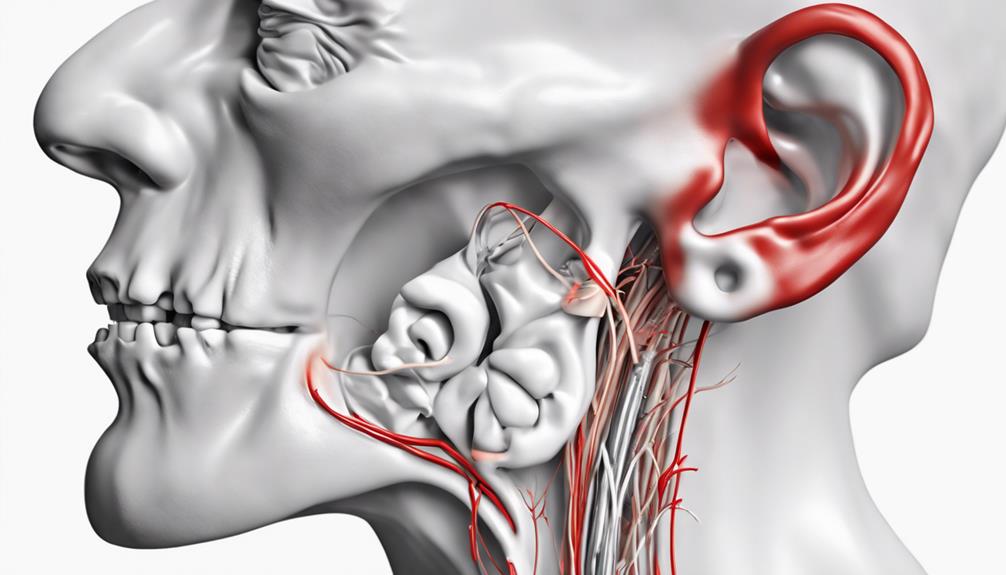
Highlighting the critical link between dental health and auditory well-being, preventing tooth abscess-related hearing issues involves maintaining good oral hygiene practices and seeking timely dental care. To safeguard against tooth abscesses and potential hearing problems, here are essential steps to consider:
- Prioritize Oral Hygiene: Diligently brush and floss your teeth to prevent dental infections that could lead to abscesses and subsequent hearing issues.
- Attend Regular Dental Check-ups: Routine visits to the dentist can help detect early signs of decay or infection, addressing them before they escalate into abscesses affecting hearing health.
- Promptly Treat Dental Infections: Swift action against dental infections and abscesses can mitigate complications that might impact your ability to hear.
- Adopt a Healthy Diet: Limit sugary foods and beverages while maintaining proper dental care practices to decrease the chances of developing an abscessed tooth and associated hearing complications.
- Seek Immediate Dental Attention: Any tooth pain or swelling should prompt a visit to the dentist promptly, preventing the progression of an abscess and preserving optimal hearing function.
Treatment Options for Hearing Loss From Tooth Abscess
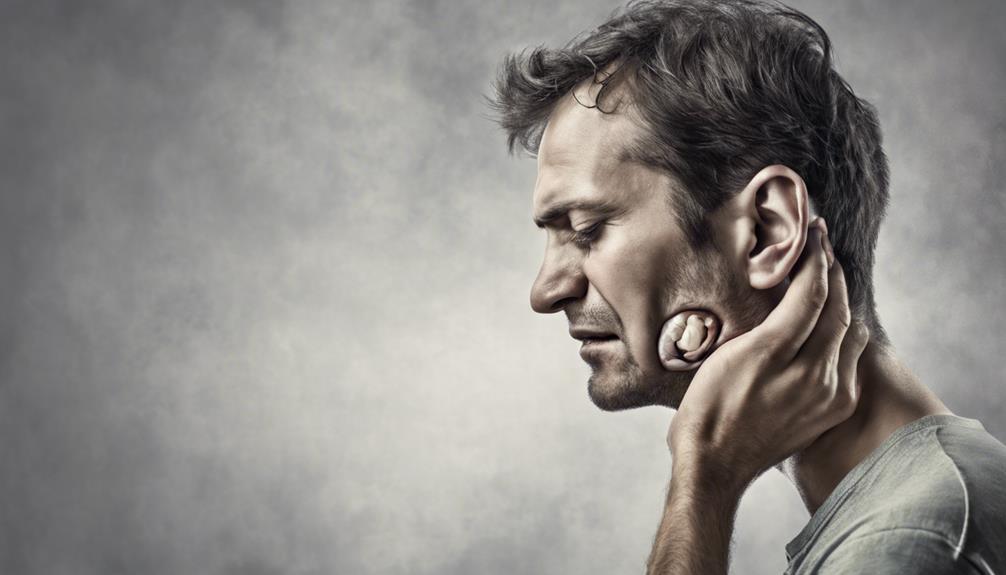
Exploring effective treatment options for hearing loss resulting from a tooth abscess involves considering antibiotics, surgical drainage, consultations with specialists, and potential interventions like hearing aids or cochlear implants. Antibiotics play a crucial role in combating the underlying infection, while surgical drainage may be necessary in severe cases to relieve pressure and avert further complications. Consulting with an otolaryngologist is essential to evaluate the extent of hearing loss and determine the most suitable treatment plan. In some instances, hearing aids or cochlear implants can help manage the hearing loss stemming from complications of a tooth abscess. Timely addressing of the tooth abscess through root canal therapy or extraction is pivotal in halting the progression of hearing deterioration due to the spread of infection.
| Treatment Options | Description |
|---|---|
| Antibiotics | Prescribed to combat the underlying infection from a tooth abscess causing hearing loss. |
| Surgical Drainage | Required in severe cases to alleviate pressure and prevent further complications. |
| Consultation | Essential with an otolaryngologist to evaluate the extent of hearing loss and determine appropriate treatment options. |
| Interventions | Hearing aids or cochlear implants may be considered to manage hearing loss resulting from complications of a tooth abscess. |
Frequently Asked Questions
Can an Abscessed Tooth Cause Hearing Loss?
Yes, an untreated abscessed tooth can indeed cause hearing loss. The infection and inflammation from the abscess can impact nearby nerves and blood vessels, affecting the ear.
Bacteria from the abscess can travel to the inner ear, disrupting its functions. The pressure and swelling from the abscess can also impact the auditory system.
Early treatment of an abscessed tooth is crucial to prevent complications that could harm hearing health.
What Are the Symptoms of a Tooth Infection Spreading to the Body?
When a tooth infection spreads to the body, symptoms can include fever, chills, and general malaise.
Swelling in the face, neck, or jaw area may indicate a severe infection. Rapid heart rate and elevated white blood cell count can signal systemic infection.
Body aches, fatigue, and swollen lymph nodes are common. If untreated, it can lead to sepsis or organ damage, which are life-threatening.
What Happens if Tooth Infection Spreads to Ear?
When a tooth infection spreads to the ear, it can lead to inner ear complications like dizziness, vertigo, tinnitus, and hearing loss. Bacteria from the infected tooth can travel to the inner ear through nerve connections, affecting balance and hearing functions.
Symptoms may include ear pain, pressure, or a feeling of fullness. Seeking prompt dental care for infected teeth can prevent the spread to the ear and potential ear-related issues.
Can Root Canals Cause Hearing Loss?
Root canals don't typically cause hearing loss directly. Infection from an untreated abscessed tooth could potentially spread to the inner ear and impact hearing. Properly treating the abscess through a root canal can prevent hearing issues.
Hearing loss from an abscessed tooth is usually due to infection complications. Quick dental care for an abscessed tooth can help avoid hearing problems.
Can a Sinus Infection Lead to an Abscessed Tooth and Hearing Loss?
A sinus infection can potentially lead to an abscessed tooth and hearing loss. The close proximity of the sinuses to the teeth can result in tooth issues when sinus infections occur. Additionally, the inner ear’s connection to the sinuses can lead to hearing loss due to sinus infections.
Conclusion
In conclusion, the link between an abscessed tooth and potential hearing loss is a serious issue that can't be ignored.
Just as a drop of water creates ripples in a pond, the bacteria from a tooth infection can spread and affect our delicate inner ear functions.
By prioritizing oral health and seeking timely treatment, we can prevent these complications and protect our hearing for a lifetime.



